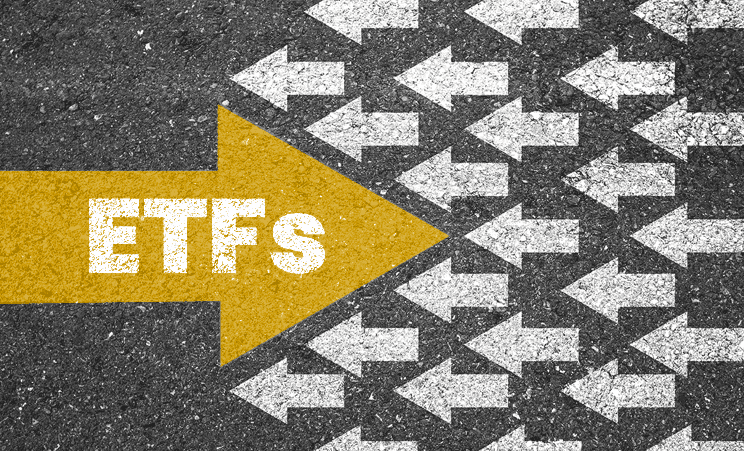ETFs Disrupting The Funds Industry: Stocks For Beginners Podcast
May 08, 2023
“I believe the most significant challenge in the broad populace is getting folks to invest and save enough to benefit from the compounding that investments bring over time, to create a pool for retirement or other huge life events.” – Charles McCain
Here are some more key notes and takeaways from a recent interview with Charles McCain, Chief Executive Officer of Harbor Capital Advisors, after being featured as a guest on an episode of Stocks For Beginners with Philip Muscatello.
Listen to the full podcast interview here.
Outlook For 2023
- Navigating the economy to a soft landing where employment can be preserved while inflation comes down will be a particularly challenging task:
- Huge amount of uncertainty around inflation, jobs, recession, geopolitical challenges with Russia/Ukraine/China, etc. makes forecasting in the short-term very difficult.
- Sentiment seems to shift by the week/day between soft and hard landings.
- Recent data indicates inflation remains stubbornly high while employment remains resilient in the face of sharp interest rate increases.
- There’s belief that the Federal Reserve will see the need to keep raising interest rates until inflation is tamed, making it more likely we will experience a harder landing meaning recession.
- Best guess is that we will see a shorter duration recession in the latter half of 2023 and that 2024will present improved conditions for growth.
Signals vs. Noise (“Volatility”)
- There is more noise this year than in the past, because of the number of different inputs both domestically and abroad that are unpredictable in outcomes.
- Russia/Ukraine – Still very unpredictable and difficult to factor in how this will evolve.
- Similarly, tough to predict how inflation challenges in the U.S. will play out.
- Separating the signals from the noise requires thoughtful patience.
- Understand that in the shortest/nearest of terms, we feel it can be extremely hard to navigate the path forward.
- We believe with a longer horizon, you can identify the signals that seek to drive better long-term outcomes.
Example of Signals Emerging From The Noise
- Commodities
- We are in a long-term period of 1) underinvestment in commodity production and 2) a societal transformation from high carbon commitment activities to medium and lower carbon commitment activities, which require a shift in the type of commodities needed and being used.
- From a signal perspective, we’re seeing that trends in the medium and long-term should hold firm relative to the short-term volatility being seen in commodity prices.
Psychological Safety (Safe Spaces in Investing Management)
- Diversification:
- Whether you’re a retail or professional investor, the dynamics around ensuring that you have a well-diversified portfolio serves a couple of purposes.
- Allows you to take advantage of different trends that can emerge over time.
- Protects you in the short-term from volatility.
- Have a medium to longer term time horizon for your investment thesis:
- I have seen studies show that if you react to the short-term and step away from the market on certain days, you can miss the significant appreciation potential that you may get by being exposed to the market over multiple years.
- I believe you should have a vision of what you want to accomplish and how you believe you can get there.
- In my experience, this allows you to be confident in your vision when the short-term noise hurts from a portfolio “red ink” vs. “black ink” perspective.
- At Harbor we believe you should be inspired by what you are investing in:
- If someone is really interested in what they’re putting in their portfolio, that creates a passion for saving and investing more.
- This passion for saving and investing more is critically important to building a pool that can support your retirement needs, home purchase, etc.
Why Harbor Believes ETFs Have Become More Popular
See investors, particularly taxable investors, increasingly turning to ETFs over mutual funds:
- They trade in real time, which we feel is of value.
- They are fully transparent, so holdings can be seen in real time vs. the typical 30-day lag with a mutual fund.
- They are generally less expensive, due to their structure of externalizing the costs associated withholding and maintaining accounts to brokers.
- There can be greater tax efficiency that is advantageous for taxable investors in the U.S. holding ETFs vs. Mutual Funds.
- Broadly younger investors look to ETFs as having the more current technology.
Harbor ETF Strategies
We offer traditionally active ETFs and ETFs that track a custom index, which one can argue are actively managed as the indices are actively constructed.
- Harbor Commodity All-Weather Strategy ETF (HGER)
- The subadvisor, Quantix Commodities, adjusts the portfolio based on its view of what's driving inflation in the United States.
- Their view around inflation is typically driven broadly by supply and demand imbalances around certain commodities driving prices of those commodities up.
- They can also be driven by debasement or depreciation of the U.S. dollar, because commodities are generally quoted in U.S. dollars. So, if our dollar depreciates, it will require more dollars to buy the same units of a commodity. And so, depending on the environment we're in, our product will likely shift.
- This is a different approach than the primary index-based commodity products that are available, which have a fixed way in which they allocate to commodities no matter what environment.
- Harbor Corporate Culture ETF (HAPI) & Harbor Corporate Culture Leaders ETF (HAPY)
- Harbor has a suite of corporate culture products.
- “The thesis behind these ETFs is that employee satisfaction, goodwill and employee engagement at companies is a key factor that differentiates stronger companies from weaker companies. We believe this results in companies that have the potential to outperform their peers in the marketplace, no matter what industry.”
- We formed a partnership with Irrational Capital, as they have a proprietary method for identifying which companies in a quantitative way have stronger human capital engagement, or what they refer to as the Human Capital Factor.
- The companies that meet the criteria are then included in the portfolios of our ETFs.
- Harbor Energy Transition Strategy ETF (RENW)
- We believe energy transition is going to be a global issue over the next several decades.
- We feel this is a thematic and inspirational way to add a core component of commodities to your portfolio.
For more information, please access our website at www.harborcapital.com or contact us at 1-866-313-5549.
Important Information
The views expressed are those of the speaker and are current only through February 27, 2023. These views are subject to change at any time based upon market or other conditions, and Harbor Capital disclaims any responsibility to update such views. These views may not be relied upon as investment advice and, because investment decisions for Harbor Capital are based on many factors, may not be relied upon as an indication of trading intent on behalf of any Harbor Capital fund. The discussion herein is general in nature and is provided for informational purposes only. There is no guarantee as to its accuracy or completeness. Past performance is no guarantee of future results.
Investing involves risk, principal loss is possible. Unlike mutual funds, ETFs may trade at a premium or discount to their net asset value.
Shares are bought and sold at market price not net asset value (NAV). Market price returns are based upon the closing composite market price and do not represent the returns you would receive if you traded shares at other times.
RISKS: (HAPY) There is no guarantee that the investment objective of the Fund will be achieved. Stock markets are volatile and equity values can decline significantly in response to adverse issues, political, regulatory, market and economic conditions. The Fund may not exactly track the performance of the Index with perfect accuracy at all times. Tracking errors may occur because of pricing differences, timing and costs incurred by the fund or during times of heightened market volatility.
The Fund relies on the Index provider's proprietary scoring methodology in assessing whether a company may be considered to have a strong corporate culture. There is no guarantee that the construction methodology will accurately assess a company to include or exclude it from the index which could have an adverse effect on the Fund's returns. The Fund's assets may be concentrated in a particular sector or industries to the extent the Index is concentrated and is subject to the risk that economic, political, or other market conditions that have a negative effect on that sector or industry will negatively impact the value of the Fund. Since the Fund may hold foreign securities, it may be subject to greater risks than funds invested only in the U.S.
Holdings are subject to risk and change. Harbor Corporate Culture Leaders ETF (HAPY) – Current Holdings
(OSEA) There is no guarantee that the investment objective of the Fund will be achieved. Stock markets are volatile and equity values can decline significantly in response to adverse issues, political, regulatory, market and economic conditions. Investing in international and emerging markets poses special risks, including potentially greater price volatility due to social, political, and economic factors, as well as currency exchange rate fluctuations. These risks are more severe for securities of issuers in emerging market regions. A non-diversified Fund may invest a greater percentage of its assets in securities of a single issuer, and/or invest in a relatively small number of issuers, it is more susceptible to risks associated with a single economic, political, or regulatory occurrence than a more diversified portfolio.
The Subadvisor considers certain ESG factors in evaluating company quality which may result in the selection or exclusion of securities for reasons other than performance and the Fund may underperform relative to other funds that do not consider ESG factors.
Holdings are subject to risk and change. Harbor International Compounders ETF (OSEA) – Current Holdings
(RENW) Commodity and Commodity Linked Derivative Risk: The Fund has exposure to commodities through its and/or the Subsidiary’s investments in commodity-linked derivative instruments. The Fund’s investments in commodity-linked derivative instruments (either directly or through the Subsidiary) and the tracking of an Index comprised of commodity futures may subject the Fund to significantly greater volatility than investments in traditional securities. The Fund is non-diversified and may invest a greater concentrate of its assets in a particular sector of the commodities market (such as metal, gas or emissions products). As a result, the Fund may be more susceptible to risks associated with those sectors. Authorized Participant Concentration/Trading Risk: Only authorized participants (“APs”) may engage in creation or redemption transactions directly with the Fund. Energy Transition Risk: The commodities included in the Index may become less representative of energy transition trends over time and the Fund’s investments may be significantly impacted by government and corporate policies. Foreign Currency Risk: Because the Index may include futures contracts denominated in foreign currencies, the Fund could be subject to currency risk.
Holdings are subject to risk and change. Harbor Energy Transition Strategy ETF (RENW) – Current Holdings
(HGER) There is no guarantee that the investment objective of the Fund will be achieved. Stock markets are volatile and equity values can decline significantly in response to adverse issuer, political, regulatory, market and economic conditions. A non-diversified Fund may invest a greater percentage of its assets in securities of a single issuer, and/or invest in a relatively small number of issuers, it is more susceptible to risks associated with a single economic, political or regulatory occurrence than a more diversified portfolio.
Commodity Risk: The Fund has exposure to commodities through its and/or the Subsidiary’s investments in commodity-linked derivative instruments. Authorized Participant Concentration/Trading Risk: Only authorized participants (“APs”) may engage in creation or redemption transactions directly with the Fund. Commodity-Linked Derivatives Risk: The Fund’s investments in commodity-linked derivative instruments (either directly or through the Subsidiary) and the tracking of an Index comprised of commodity futures may subject the Fund to significantly greater volatility than investments in traditional securities.
Holdings are subject to risk and change. Harbor Commodity All-Weather Strategy ETF (HGER) – Current Holdings
Diversification does not assure a profit or protect against loss in a declining market.
The Harbor Funds mentioned are not an ESG dedicated Fund. ESG investing is defined as utilizing environmental, social, and governance (ESG) criteria as a set of standards for a company's operations that socially conscious investors use to screen potential investments.
The Quantix Commodity Index (QCITR) is calculated on a total return basis, which combines the returns of the futures contracts with the returns on cash collateral invested in 13-week U.S. Treasury Bills. This unmanaged index does not reflect fees and expenses and is not available for direct investment. The Quantix Commodity Index was developed by Quantix Commodities LP and is owned by Quantix Commodities Indices LLC (“Quantix”).
The QCITR was created with the objective of being a diversified inflation hedge for investors using commodity futures contracts, traded in the U.S. and the U.K., as part of their core investment. Commodity futures are distinctive in their relationship to inflation and are generally regarded as having the highest positive correlation to inflation of all the major asset classes. The QII is designed to provide a risk management framework to hedge inflation risk appropriately in connection with commodity investing, taking account of the relative inflation sensitivity of each commodity among a defined universe of commodities, the relative cost of holding a rolling, U.S. or U.K.-listed futures position in a given commodity and the relative impact of inflation on each particular commodity.
The Quantix Energy Transition Index (QET) was developed by Quantix with the objective of providing diversified exposure to the building blocks of the accelerating transition from carbon-intensive energy sources to less carbon intensive sources of energy using commodity futures. Commodity futures that provide exposure to the energy transition theme are considered component candidates for inclusion in the Index. Examples of component commodity candidates include copper, aluminum, nickel, zinc, lead, natural gas, silver, palladium, platinum, soybean oil, ethanol, emissions – European Union Allowances (EUA), and emissions – California Carbon Allowances (CCA). The selection of commodities is subject to periodic review by Quantix Commodities Indices (QCI). Under normal conditions, the Index maintains exposure to at least 10 commodities from its eligible universe in the United States (U.S.), Canada, United Kingdom (U.K.) and other European exchanges. Commodity futures from the component candidates are selected for the Index and weighted based on QCI’s quantitative methodology. Under normal circumstances, the Index is rebalanced on a monthly basis. The index listed is unmanaged and does not reflect fees and expenses and is not available for direct investment.
Note about tax-efficiency: ETFs are subject to capital gains tax and taxation of dividend income. However, ETFs are structured in such a manner that taxes are generally minimized for the holder of the ETF. An ETF manager accommodates investment inflows and outflows by creating or redeeming “creation units,” which are baskets of assets. As a result, the investor usually is not exposed to capital gains on any individual security in the underlying portfolio. However, capital gains tax may be incurred by the investor after the ETF is sold.
Quantix Commodities LP is a third-party subadvisor to the Harbor Commodity All-Weather Strategy ETF and the Harbor Energy Transition Strategy ETF.
Irrational Capital is a third-party index provider to the Harbor Corporate Culture Leaders ETF.
Harbor Capital Advisors, Inc., Quantix Commodities LP, Irrational Capital and Foreside Funds Services, LLC are not affiliated with Phil Muscatello, Fin Pods, or Money Sherpa.
2890713

